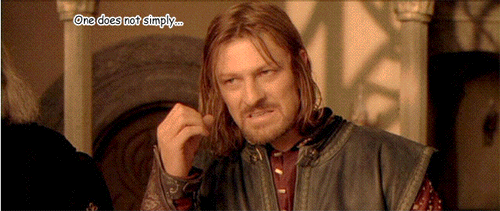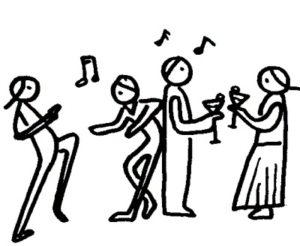Evidently the visionary-author blogosphere has been echoing with a controversy: is it okay for Christians â especially attempting authors â to write negative reviews of other books?
And last Friday brought a related discussion: is it okay for Christians to spoof their own?
This isnât something I thought about before, to be honest, during or after my interview with Ted Kluck, whoâs part of a committee writing a POD parody called Beauty and the Mark of the Beast, spoofing Christian end-times fiction. Until now I hadnât considered that a parody could seem intrinsically nasty â which I suppose it could, and which I must consider.
Why? I would suggest two reasons.
First: people often parody things they actually enjoy â though one might call this affectionate parody that mostly spoofs fansâ reactions to a story or franchise, or serves as a takeoff for goofiness thatâs actually unrelated. Example:

This is different from a more-hostile Lord of the Rings parody â and I wish I could illustrate what such a mean-spirited parody would look like, but I donât have it in me and frankly canât think of anything to spoof in the books. (The films, though, present their best opportunity in the last film when Legolas so astutely remarks that Aragornâs plan is to create âa diversion.â)
And many ways exist to make fun of a story, not all of them hostile, such as:
- Affectionate parody, which can include making fun of an actual story though with love for the story itself. As my wife said this morning, so many spoofs and funny fanfiction works on Lord of the Rings websites were likely written by those who cried during Boromirâs death and can name nearly all of Elrondâs antecedents.
-

How It Should Have Ended offers parodies and takeoffs that are almost always affectionate.
Takeoff, perhaps best illustrated by the animation above. Its maker wasnât mocking Boromir, or Middle-earth pronunciations, or anything, but only being goofy.
- Satire, such as C.S. Lewisâs The Screwtape Letters â no specific person/thing is being mocked, but the comparison of Hellâs hierarchy with a business bureaucracy is classic. It also helps us laugh at ourselves (more on this in a bit).
But then thereâs:
- Hostile parody, which resembles affectionate parody but is clearly meant to disparage the target. Weâve all seen the slamming of Twilight or other things for being poorly written or shallow, or political cartoons showing presidents with exaggerated ears or rhetoric.
Is this acceptable for a Christian? This is something Iâm still sorting out, especially as a still-recovering political columnist. Scripture has precedent for making fun of bad guys â Jesusâ slams of the Pharisees, for sure, being the best-known example. But that was Jesus. He knew the Pharisees He was slamming would not repent and believe in Him. Weâre never told to imitate Him in that regard â instead, weâre told to love our enemies â and certainly not adopt that practice as the method of dealing with those who despise or persecute Christians.
Thus, hostile parody would seem off-limits for the Christian. But as I noted above, the two categories can seem to overlap, making a parodyâs intent difficult to discern.
 Does the Beauty and the Mark of the Beast fall into affectionate parody? From what Iâve seen on the work-in-progressâs website, I think it does. Most of whatâs there seems to poke gentle fun at the responses of some end-times thriller fans, and the worst kind of the-end-is-near reactionaries. Actually a lot of what is there doesnât spoof Left Behind as much as pop evangelicalism, obsessions with Christians sports celebrities, even legalism. Example:
Does the Beauty and the Mark of the Beast fall into affectionate parody? From what Iâve seen on the work-in-progressâs website, I think it does. Most of whatâs there seems to poke gentle fun at the responses of some end-times thriller fans, and the worst kind of the-end-is-near reactionaries. Actually a lot of what is there doesnât spoof Left Behind as much as pop evangelicalism, obsessions with Christians sports celebrities, even legalism. Example:
Parker, Strongbow hypothesizes, is his most worldly teammate, and therefore least likely of his acquaintances to be raptured. He never kneels in the endzone after scoring touchdowns, has lots of tattoos, and listens to rap music. He has never once thanked God in a postgame interview, a track record that Strongbow privately feels is semi-unacceptable.
Strongbow was also the only player on the Denver Broncos to refuse implementation of the state-of-the-art NFL.com⢠Fan/Player Homing Device⢠– a chip which is implanted just below the skin at the nape of a playerâs neck, and allows subscribing fans to track measurables like a playerâs resting heart rate, exercise habits, diet, sexual activity, and frequency of urination. It is billed by the website as âThe Next Level in Player/Fan Interaction!â Strongbow feared that the implementation of the chip had serious End Times implications.
Whatâs being spoofed here? I hate to give away the jokes, but here it is: thinking that sports stars arenât âChristianâ enough if they donât preach in every interview, demigod-level sports star status in general, and suspecting things like computer chips as forecasting dooooom.
These are things that real Christians, seriously, have gotten into â and which we might need to remember to laugh at ourselves about. Oh yeah, I have done that before, havenât I?
Itâll help add humility, just as a well-written, gracious, negative review could help an author.
Moreover, knowing of potential parody red-zones could help an author find and eliminate them in advance, along with grammar and character development errors, eh wot?

"Doctor Who and the Curse of Fatal Death" (1999): a lampoon of classic "Who." Guess what its writer, Steven Moffat, is doing now? Running, and still loving, the actual "Doctor Who" series.
Earlier I mentioned two reasons for enjoying affectionate parody. The second is this: Iâve written parody myself. Even Left Behind parody. I loved Left Behind years ago â and to some extent still do, though Iâve re-thought some end-times views â but still had to spoof it. However, like other fanfiction for a beloved franchise, mine was more a spoof of what would happen if Disney (despised more back then, thanks to the boycotts) got ahold of Left Behind.
Observe:
(SCENE 20: The evil and mean-spirited secretary general for the U.N.ânow called the ETâNicolae Carpathia, and his cute but sinister wisecracking demon sidekick/henchman, Leonardo âSlimerâ Fortunato, are both in their office at a top-secret military base in the ET [Earth Takeover] building.)
NICOLAE CARPATHIA: Moo-hoo-ha-ha-ah-ah-ee-ee-eeee!
LEONARDO âSLIMERâ FORTUNATO: Ya-ha-ha-ah-ah-ee-ee-eeee!
NICOLAE: Well, Slimer, we done heard lotsa news about them American folks storinâ up them weapons ta shoot at me, but we got âem first! We done gots rid of that stinkinâ White House thingy and kilt that sissy patriotic president oâ theirs, Bill Clinton.
SLIMER: And Viccce Presssident Al Gore too, Missster Carpathia. We will not have to worry about them ever again.
[Note: actually the rest of the scene shows that they magically escaped and joined the good guys.]
NICOLAE: Yah, anâ that finally makes my takeover oâ the U.S. complete! But now we gots to blow up sâmore stuff in other places so everybody knows that I gots more special effects than they do.
SLIMER: Now we will presss the buttonsss that will activate our sssecret arsssenal of computer-generated exxxplosssionsss, flying bodiesss and their ressspective partsss, and, of courssse, lotsss of fireballsss and noissse. (reaches for control panel)
NICOLAE: Yah, leâs do it! Iâll blow up the Great Wall of China and the Taj Mahal, and you take Buckingham Palace and the Statue of Liberty.
SLIMER: Okay, and I will alssso blow up the Sssearsss Tower.
NICOLAE: Nuh-uh! I wanna blow up the Sears Tower!
SLIMER: No, me!
NICOLAE: Me!
SLIMER: Me!
NICOLAE: But I get to hit them there Great Pyramid things!
SLIMER: No! Thossse are mine!
(Both of them jump onto the control panel and begin pushing buttons at random.)
So far I believe this is still something I would not mind the Left Behind series authors seeing. Itâs affectionate, not hostile, and helps us humbly see flaws while having fun.
The same held true when in 1999, on the Left Behind series online bulletin board, I wrote a âproofâ that the end of the world was coming on April 1, 2000. Hundreds posted in response, among them dozens who clamored to cry out: You canât predict the date of Jesusâ return!
But one of the good guys, in response, recalled how while he was editing a magazine some years ago, the publication ran a bit of satirical fiction: about a woman who couldnât get her non-Christian husband to come to church, no matter how much she nagged and cajoled him. People wrote to the magazine and insisted Thatâs not how you do it at all!
âLots of people donât get it,â he observed about both spoofs.
That man was Jerry Jenkins. And he and the Left Behind series are largely responsible for my love of visionary fiction today â and for Speculative Faith version 2.0 being here.
Given all that, what do you think about affectionate/hostile parody, takeoff and satire? Have I missed something? Is it okay to spoof something we enjoy? What if we actually did get to know the person whose work you once spoofed or critiqued? Has this ever happened to you?



















































 Does the Beauty and the Mark of the Beast fall into affectionate parody? From what Iâve seen on
Does the Beauty and the Mark of the Beast fall into affectionate parody? From what Iâve seen on 



